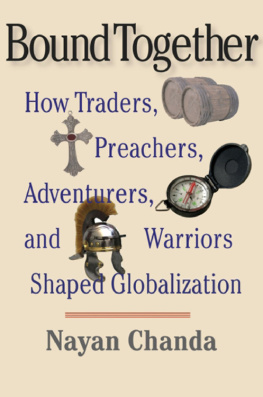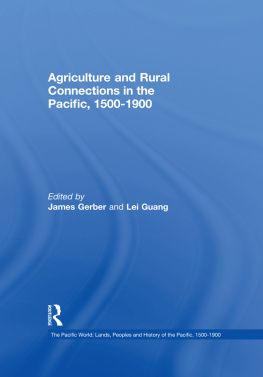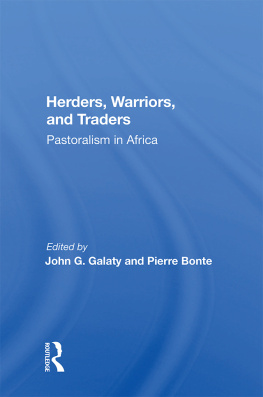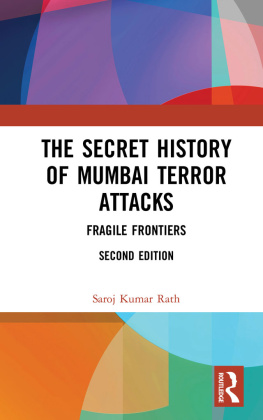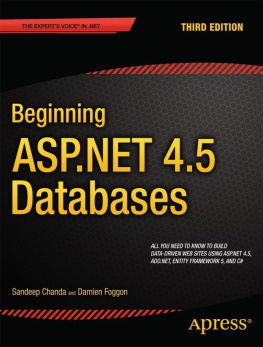
Praise for Bound Together
Given the avalanche of books on globalization it is reasonable to assume that for now the subject has been exhausted. This assumption crumbles after one reads Nayan Chandas masterful analysis and discovers that this gifted writer has added a new and important layer to our understanding of why and how we are all Bound Together. A must read.
Moiss Naim, editor in chief, Foreign Policy
Bound Together is destined to be a classic book for the twenty-first century.
Author Nayan Chanda has combined deep and far-ranging scholarship with a journalists touch for storytelling to craft an enthralling narrative of humankind from our birth in Africa to our addiction to the Internet. Chanda is a true global citizen. His book should be read in every home, school, business, and embassy in the world, and become a vital part of our common intellectual heritage.
Ambassador Derek Shearer, Stuart Chevalier Professor of Diplomacy and World Affairs and Director of Global Affairs, Occidental College
Chandas account of globalization is a breath of fresh air. His treatment of the topic, from its origins with the first humans out of Africa to its most recent appearance in financial markets, is comprehensive, informed, and judicious.
Refreshingly personal and humorous, it is probably the best single-volume work on world/global history now available, and a must for all students of the subject. Along the way, India, for example, becomes as much a focus as Europe in the overall story.
Bruce Mazlish, professor of history emeritus, MIT
It is, in my view, a wonderful readincredibly informative, insightful, and written with energy, eloquence, and simplicity. The themes are fresh and the organization especially interesting. Some of the great strengths of the book are the way he relates history to the present, the global perspective throughout, the broader-than-economics focus, and the way he describes the overlap of forces that have led to the world we now live in. My guess is that this book will be widely read and have a special place on any bookshelf that contains works on globalization.
Jeffrey Garten, former dean and Juan Trippe Professor in the Practice of International Trade, Finance, and Business, Yale School of Management
Bound Together
Bound Together
How Traders, Preachers, Adventurers, and
Warriors Shaped Globalization
Nayan Chanda
Yale University Press
New Haven and London
A Caravan book. For more information, visit www.caravanbooks.org Copyright 2007 by Nayan Chanda.
All rights reserved.
This book may not be reproduced, in whole or in part, including illustrations, in any form (beyond that copying permitted by Sections 107 and 108 of the U.S.
Copyright Law and except by reviewers for the public press), without written permission from the publishers.
Set in Adobe Garamond and Stone Sans types by The Composing Room of Michigan, Inc.
Printed in the United States of America.
Library of Congress Cataloging-in-Publication Data Chanda, Nayan.
Bound together : how traders, preachers, adventurers, and warriors shaped globalization / Nayan Chanda.
p.
cm.
Includes bibliographical references and index.
isbn 978-0-300-11201-6 (clothbound : alk. paper) 1. Social evolution. 2. CommerceHistory. 3. Intercultural communicationHistory.
4. Culture diffusionHistory. 5. GlobalizationHistory.
I. Title.
II. Title: How traders, preachers, adventurers, and warriors shaped globalization.
III. Title: Traders, preachers, adventurers, and warriors shaped globalization.
hm626.c45 2007
303.48209dc22
2007000430
A catalogue record for this book is available from the British Library.
The paper in this book meets the guidelines for permanence and durability of the Committee on Production Guidelines for Book Longevity of the Council on Library Resources.
10 9 8 7 6 5 4 3 2 1
To the memory of my parents
and
To my other parents, Amarjit and Bhagwant
Contents
Introduction, ix
The African Beginning, 1
From Camel Commerce to E-Commerce, 35
The World Inside, 71
Preachers World, 105
World in Motion, 145
The Imperial Weave, 175
Slaves, Germs, and Trojan Horses, 209
Globalization: From Buzzword to Curse, 245
Whos Afraid of Globalization?, 271
The Road Ahead, 305
Chronology, 321
Acknowledgments, 331
Notes, 335
Index, 373
Introduction
A few days after my wife and I had moved into our home in New Haven, Connecticut, an electrician came to fix some electrical outlets that werent working. Jerry was middle-aged and friendly, and he asked me what I did at Yale. When I mentioned my affiliation with the Yale Center for the Study of Globalization, he seemed stunned, as if I had just confessed to being a charter member of a Colombian drug cartel. Oh! God help you, he muttered. Puzzled, I asked what was wrong. Jerry was clearly surprised to meet someone who he thought actually worked for globalization. Isnt it true that globalization destroys the rain forest? he asked by way of explanation. My protestation that the closest I had ventured to the Amazon was to order a few books did little to help my standing.
But Jerrys reaction had raised important questions. What precisely is globalization, and why is it accused of damaging the rain forest? It seems to have appeared out of nowhere, and now it is everywhere. Almost every problemeven extraordinary developmentshas been laid at the door of this phenomenon called globalization. Its role in damaging rain forests is perhaps the easiest to understand. Forests are ix
Introduction
being cleared mainly to create farmland for the worlds growing population.
Rising international trade and the growing demand for construction materials and furniture have brought traders and loggers into the act. To answer Jerrys concerns, I thought it was important to understand who the globalizers are, what they are doing and why, and how long they have been at it.
Since the word globalization appeared in the dictionary, its meaning has undergone a massive transformation. Just two of the dozens of definitions of globalization illustrate the problem in grappling with this phenomenon. Writing in the Encyclopedia Britannica, James L. Watson defines globalization in cultural termsas the process by which the experience of everyday life, marked by the diffusion of commodities and ideas, can foster a standardization of cultural expressions around the world. The official World Bank definition of globalization is stated, not surprisingly, in purely economic terms, as the freedom and ability of individuals and firms to initiate voluntary economic transactions with residents of other countries.1 Left-wing critics, echoing Karl Marxs observation about the werewolfish hunger of capitalism reaching the four corners of the world, see globalization as synonymous with expansionist and exploitative capitalism. Looking at globalization through the prism of business and economics helps one to understand the Internet, the mobile phone, and the cable TV-connected world we inhabit, but it does not explain how human life was globalized long before capitalism was formulated or electricity invented.
Many recent books, notably Thomas L. Friedmans The World Is Flat, have explained how mobile capital, trade, and technology have created todays instantaneously connected, interdependent world. Economic historians like Kevin ORourke and John G. Williamson have shown how the transportation revolution in the late nineteenth century kicked off large-scale trade and migration, laying the foundation for the current era of globalization. In fact, in their view, globalization began when large-scale trading brought about a convergence of commodity prices all over the world. But globalization defined in strictly economic terms leaves unexplained the myriad instances of global connectedness and indeed convergence that appeared long before the steamship.
Next page
